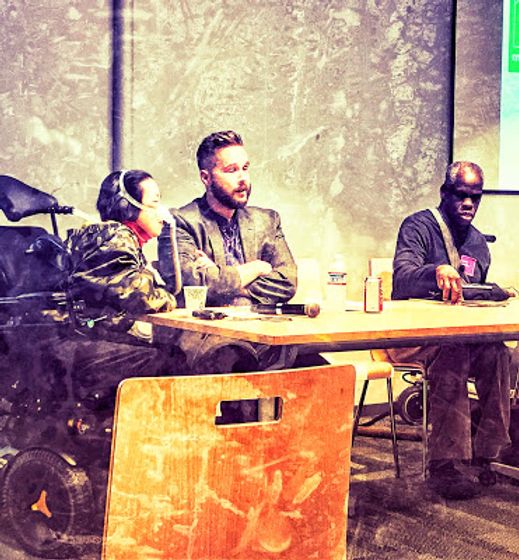In 1999, the Supreme Court held in Olmstead that the segregation of people with disabilities is discrimination and that people with disabilities have the right to live, work, and thrive in the community. 20 years later, we can point to progress and success—but there is still work to be done and conversations to be had.
This past week, we hosted two conversations –one in San Francisco, one in San Jose — reflecting on Olmstead and its implications for disability, inclusion, and community life. We are so grateful to our incredible panelists: Alice Wong, John Marble, Danh Trang, and Leroy Moore who joined us in San Francisco and Mesalina Madrid, Tita Das, Ben McMullan, and Alison Morantz who joined us in San Jose.
Panelists covered a wide range of topics, but some important themes emerged from both discussions:
Intersectional Policy
Panelists emphasized that Olmstead isn’t a stand alone court decision, but intersects with a host of policy issues including housing, voting, criminal justice and police brutality, and employment. Panelists shared traumatic police encounters, trouble retaining accessible and affordable housing, challenges in the workplace, and frustration with the lack of political representation for disabled voters (Did you know that none of the 2020 presidential candidates’ have websites that are fully accessible?). These experiences reinforce that Olmstead was a step in the right direction, but far more work needs to be done.
Disability and Community
While it’s easy to focus on the legal and regulatory side of Olmstead, our panelists honed in on how the ruling and the legacy is fundamentally about people with disabilities being able to contribute to and thrive in their communities. Mesalina talked about how once she transitioned to community based living from an institution, she was able to connect with her neighbors and translate documents from Spanish to English, and run errands for them. John talked about Lois Carter, the woman at the center of the Olmstead decision, and a photo he came across of her smiling at a barbecue in her backyard with a friend on her 47th birthday. Living out of an institution, Lois was able to enjoy life — the complexities and the simplicities — on her terms. That’s what Olmstead is fundamentally about.
Allyship
Micaela, from The Kelsey, asked a question about allyship, and how people without disabilities can support the disability community without being paternalistic. Alice responded that first and foremost, people must acknowledge what they don’t know. Learn from people with lived experience. Find out what ableism exists systematically, and in your own every day life. She stressed the importance of material support too in hiring people with disabilities, supporting their work, patronizing their businesses, and engaging disabled individuals in impactful, non-paternalistic ways.
Intersectional Identities
Nearly all panelists touched on intersections between disability and gender, age, race, socioeconomic status, and sexuality. Too often disability is viewed as a singular identity without acknowledging these crucial intersections. Other times, the disability justice community fails to acknowledge bias within our own movement. Intersectional identity can compound social justice and opportunity barriers for individuals with disabilities. People who are poor and disabled or seniors with disabilities face significant housing shortages. Women with disabilities are underrepresented in politics, leadership, and employment. Black and brown people with disabilities are subject to mass incarceration and police brutality. Disability justice and other social justice movements cannot be decoupled.
Exercise in Imagination
Several times during her remarks, Alice mentioned that systems and policies fail people with disabilities because of a lack of imagination. Programs like Medicaid and Medical impose limits on how much people can work. Reporting and regulations add undue burden on individuals and families. Barriers to housing and employment are left unaddressed. Language and structures further entrench ableism and discrimination. What’s lacking is imagination—a willingness to push beyond the status quo, to reject existing barriers as forgone conclusions, and to bring in disabled individuals as innovators and change makers. We imagine a world where the legacy of Olmstead is visible through the lives of people with disabilities who are able to live, work, play, and contribute in communities everywhere.
We’ll be sharing a close captioned video recap of our San Francisco panel in our next newsletter. You can also learn more in this recap from Thinking Person’s Guide to Autism, and read Alice’s opening remarks from the panel here.
